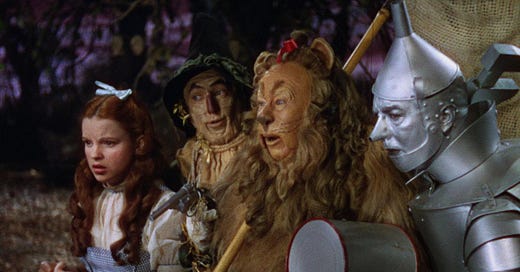This month we’ll jump into some light literary analysis with a look at Rule of the Bone by Russel Banks. Surprisingly, this story contains an unexpected element that it shares with Neil Giaman’s, The Ocean at the End of the Lane and the classic 1939 musical, The Wizard of Oz.
In a writing class during my undergraduate degree, I had, as required reading, Rule of the Bone by Russel Banks. If you’re not familiar, the story follows Chappie, a 13-year-old whose stepfather, Ken, turns out to be just a little too touchy and not in a you hurt my feelings kind of way. To get out of his shitty situation, the kid runs away from home.
Out on his own, he is soon stayin’ in his friend’s apartment above a video store with some half-ass bikers who call themselves the Adirondack Iron. From there, he sets out on his own hero’s journey. It’s a coming-of-age story that has been compared to Twain’s The Adventures of Huckleberry Finn.
My first read, I just couldn’t with this book. It felt fake. Like Banks was writing about something, he didn’t know the least bit about. You see, I have lived in and adjacent to the world of dealers and bikers, and nothing in this story came off as right.
For example, the Adirondack Iron just sowed patches on their cuts, and like that, they were bikers. In the real world, you can't just wake up one morning, decide you're a biker, and start sportin’ colors. That'll get you killed, stuffed in a duffel bag, and tossed in the river, and probably not in the order that would make you the most comfortable.
The conflict in Banks’ story is human versus human. It has Chappie holding his own against adults who could destroy him and not give the least of a fuck. Then, one night after a bit of dark liquor, an idea began to stir in my fuzzy brain. I don’t know if Banks intended it, but in creating an idealized criminal underground, he created something far enough from reality that it could be all cooked up in the imagination of a 13-year-old boy.
My drunken epiphany was that Chappie was actually hunkered down in his mind while Ken rummaged around under his covers. And just like that, the story shifted to human versus self. It became psychological. If you look closely enough, you can see that the characters represent what the kid wants or needs. The Adirondack Iron are power. Rose, a young girl he rescues from a pedophile, is his desire to be saved. And I-Man, a Jamaican squatter, is a wished-for mentor/protector.
This trope is common enough in magical realism and fantasy. It shows up in the Wizard of Oz or Alice’s Adventures in Wonderland, and even though some of my friends say I’m seeing things that aren’t there, I would argue that Neil Gaiman pulls the same trick in The Ocean at the End of the Lane.
In Gaiman’s story, as a young child, the narrator returns from an otherworldly realm with a malevolent creature in tow. After causing some funny business with coins, a dead fish, and some fighting neighbors, the creature takes the form of the child's new nanny, Ursula Monkton. From this perspective, it is a human versus supernatural story.
The narrator is befriended by Lettie Hempstock, who is an incarnation of the Maiden of neo-pagan triple Goddess fame. With the help of Gran, the Crone, and Ginnie, the Mother, Lettie protects the narrator from Ursula and his father, who has become abusive. By the end, the creature is banished, and Lettie has given her life to save her friend from some buzzards who come to devour things that don't belong in this world.
But if Ursula is just a nanny who happens to be pretty fuckin’ hot and is banging the kid’s old man, then the story is again psychological. Where in Rule of the Bone, the events all take place in Chappie’s mind; here, they are real but altered by the narrator’s imagination. Either way, a child finds an escape from things beyond their control.
Gaiman and Banks use an overarching story to represent the conflict in each of their young protagonists. I would argue that Chippie’s world is as much a place of magical realism as Oz or Wonderland or Gaiman’s Hempstock Farm. Their stories also allow the reader to see things that may not be comfortable without the need to stare directly into the abyss.




Hmm, puts me in mind of "Heavenly Creatures" - will have to add to TBR and get back to you ;)
Sounds like something I may want to read. As a child I loved the Wizard of Oz. It also made me feel special as my birth name is Dorothy.
I watched it whenever I could- before Video and DVDs and as an adult I watched it with my kids.
Each time I saw something magical I missed the first 15 times.
Great writing by the way.